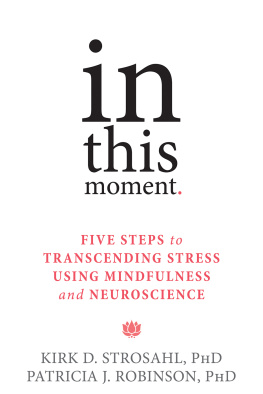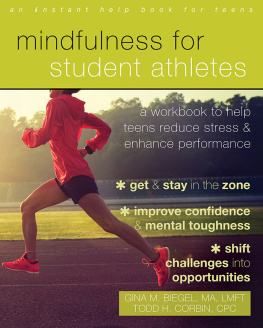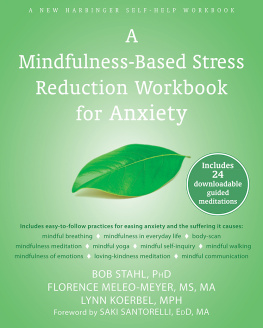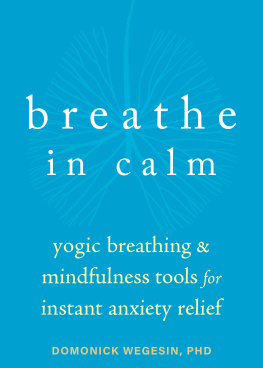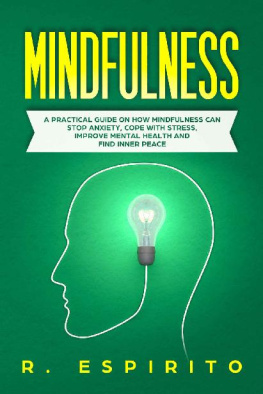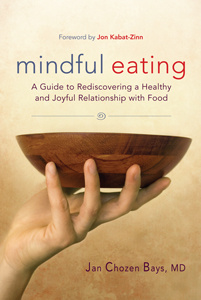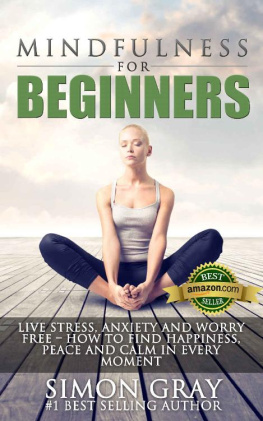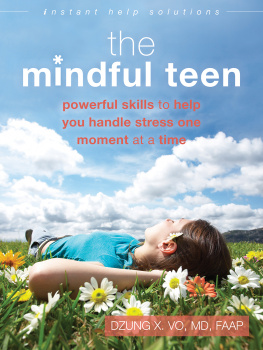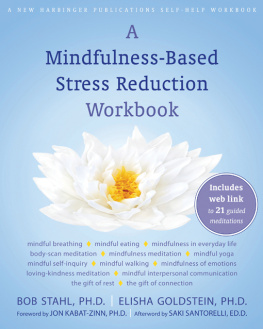
Kirk D. Strosahl, PhD, is cofounder of acceptance and commitment therapy (ACT), a cognitive behavioral approach that has gained widespread adoption in the mental health and substance abuse communities. Strosahl works as a practicing psychologist at Central Washington Family Medicine, a community health center providing health care to medically underserved patients. He also teaches family medicine physicians in how to use the principles of mindfulness and acceptance in general practice. Strosahl lives in Zillah, WA.
Patricia J. Robinson, PhD, is director of training and program evaluation at Mountainview Consulting Group, Inc., a firm that assists health care systems with integrating behavioral health services into primary care settings. She is author of Real Behavior Change in Primary Care, and coauthor of The Mindfulness and Acceptance Workbook for Depression. After exploring primary care psychology as a researcher, she devoted her attention to dissemination in rural America, urban public health departments, and military medical treatment facilities. Robinson lives in Portland, OR.
Chronic stress is a marker of living life on autopilot. This book gently wakes you up. It asks you instead to live life inside non-judgmental awareness and intentionalityand to do it right here, right now, in this moment. Written in Kirk Strosahl and Patricia Robinsons usual clear, step-by-step style, it contains scores of practical tips and exercises that gently train and practice a mindful path through stress. You cannot help but be moved.
Steven C. Hayes, PhD, cofounder of acceptance and commitment therapy (ACT) and author of Get Out of Your Mind and Into Your Life

Publishers Note
This publication is designed to provide accurate and authoritative information in regard to the subject matter covered. It is sold with the understanding that the publisher is not engaged in rendering psychological, financial, legal, or other professional services. If expert assistance or counseling is needed, the services of a competent professional should be sought.
Distributed in Canada by Raincoast Books
Copyright 2015 by Kirk D. Strosahl and Patricia J. Robinson
New Harbinger Publications, Inc.
5674 Shattuck Avenue
Oakland, CA 94609
www.newharbinger.com
Self-assessments in chapter 3 of this book are adapted from the Five-Facet Mindfulness Questionnaire (FFMQ) in R. A. Baer, G. T. Smith, J. Hopkins, J. Krietemeyer, and L. Toney. 2006. Using Self-Report Assessment Methods to Explore Facets of Mindfulness. Assessment 13:2745. Used by permission of the authors.
Cover design by Amy Shoup
Acquired by Catharine Meyers
Edited by Jasmine Star
All Rights Reserved
Library of Congress Cataloging-in-Publication Data
Strosahl, Kirk, 1950
In this moment : five steps to transcending stress using mindfulness and neuroscience / Kirk D. Strosahl and Patricia J. Robinson.
pages cm
Summary: Little daily hassles can often add up to big stress. In In This Moment, two internationally-renowned psychologists show readers how to connect with the present moment and find a sense of calm and serenity using a breakthrough, evidence-based program grounded in mindfulness and neuroscience. Over time, chronic stress can take its toll on mental and physical health, leading to everything from anxiety and depression to weight gain and disease. By practicing the exercises in this book, readers will learn to combat stress in healthy ways, stay balanced, and live happier lives, no matter what challenges arise-- Provided by publisher.
Includes bibliographical references.
ISBN 978-1-62625-127-4 (paperback) -- ISBN 978-1-62625-128-1 (pdf e-book) -- ISBN 978-1-62625-129-8 (epub) 1. Stress management. 2. Meditation--Therapeutic use. 3. Neuroplasticity. 4. Neurosciences. I. Robinson, Patricia J. II. Title.
RA785.S785 2015
613--dc23
2014033245
To my better half, Patti. How fortunate I am to have you as my life partner and my writing partner!
Kirk D. Strosahl
To Kirk, Lori, Donna, Pam, Judy, Regan Lara, Joanna May, Frances Ann, and the other 7.046 billion kindred spirits on planet Earth; my prayer in this moment is that you respond mindfully to stress.
Patricia J. Robinson
Contents
Introduction
Stress researchers used to believe that the impact of big life events, such as divorce, natural catastrophes, or the death of a loved one, were the biggest threats to our health and well-being. Then they discovered that the real threat to emotional and physical health is the day in, day out stress of living in modern society. Indeed, the pace of modern life seems to be accelerating ever more quickly, as one innovation after another is introduced to create efficiency in our daily routines, from how we communicate with one another to how work is done on an assembly line. We believe these changes are adding to, not easing, the problem of daily stress.
As people get more efficient, they tend to just add more things to their to-do lists, rather than devoting the time saved to leisure pursuits and relaxation. The clients we work with continue to complain about the same high stress levels we were hearing about one or two decades ago.
As it turns out, you dont have to be a victim of major life events to have your health permanently affected by stress. The daily hassles of modern life can do the job very nicely. Stress-related diseases like hypertension, cardiovascular disease, diabetes, and cancer are at all-time highs, and nearly 50 percent of people over age sixty have at least one chronic disease that directly results from and is made worse by stress (CDC 2009).
Many risk factors for developing chronic disease are often simply ill-fated attempts to cope with daily stress. Eating can reduce stress but may also lead to obesity. Smoking is relaxing but leads to heart disease and cancer. Mental and social health are also directly affected by stress, with daily stress having been linked to problems with depression, anxiety, and anger, to name a few. Stress affects relationships with partners, children, family, friends, coworkers, and others. In general, it seems that most people have a very limited tool kit for dealing with the daily stress of life and could benefit from learning a few more tricks.
The Benefits of a Mindfulness-Based Lifestyle
This book is driven by our desire to promote a new approach to contemporary living and the stress it produces. We believe that adopting a mindfulness-based lifestyle allows people to be in the present moment, experience the joy of being alive, and act with a sense of life purpose.
Why would mindfulness act as a protective factor against the ravages of daily stress? The short answer is that, when uncontrolled, stress-related physiological arousal creates toxic neurochemical reactions in the brain and internal organs that can damage both physical and mental health. Mindfulness strategies activate portions of the nervous system that function to offset and control the harmful physiological effects of stress.
The better you get at using mindfulness strategies in your daily routine, the more able youll be to regulate the noxious impacts of stress. Apart from this important benefit, practicing mindfulness in daily life can produce positive changes in mental outlook, improve social health, and increase mental efficiency. The skills taught in this book are based in cutting-edge research into the core facets of mindfulness. It turns out that mindfulness is not just one skill; its a collection of unique abilities, each of which is important for creating a stress-transcending lifestyle.

